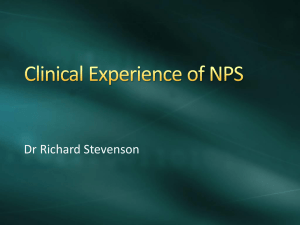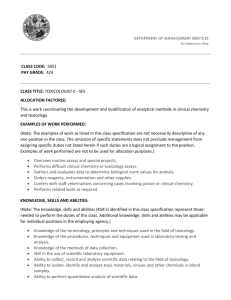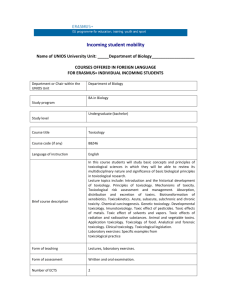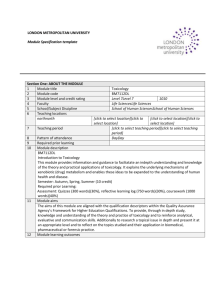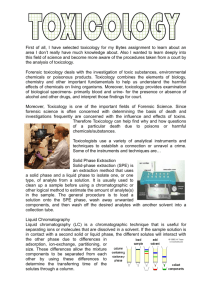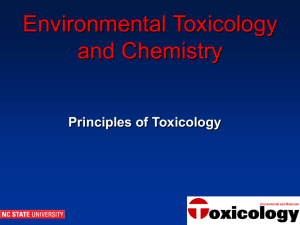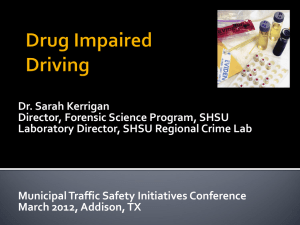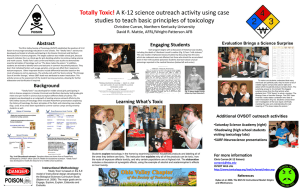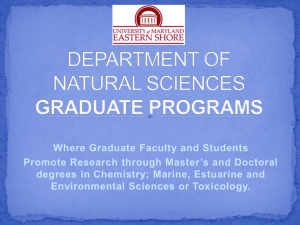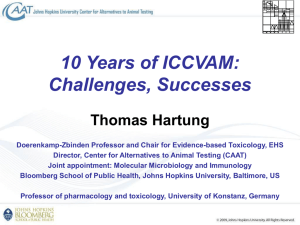Environmental Toxicology - chulabhorn graduate institute
advertisement
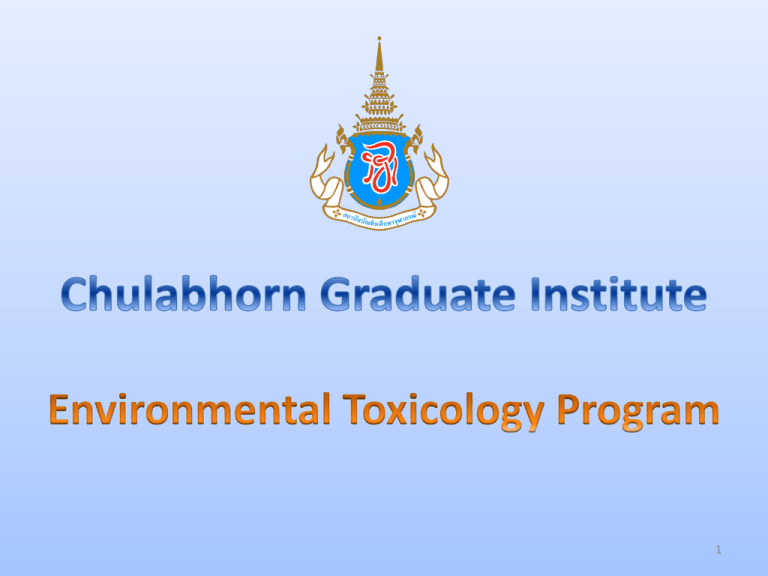
1 Program Management Committee Assoc. Prof. Dr. Jutamaad Satayavivad Chairperson 2 Program Management Committee Dr. Panida Navasumrit Dr. Daam Settachan Dr. Nuchanart Rangkadilok Dr. Piyajit Watcharasit Dr. Jantamas Kanitwithayanun Environmental Toxicology Overview 4 ET Curriculum - credits Diploma (credits) M.S. (credits) Ph. D. (credits) Required Courses 12* 9 12 Elective Courses 12 15 12 - 12 36 24 36 60 2 years 2-3 years 3-4 years Thesis Total Duration * Basic science (3) + Environmental Toxicology (9) = 12 5 ET Curriculum – core courses • • • • Principles of Toxicology (3 credits) Environmental Toxicology (2 credits) Seminar in Environmental Toxicology (2 credits) Environmental and Health Risk Assessment and Management of Toxic Chemicals (2 credits) • Detection of Environmental Pollutants and Monitoring of Health Effects (3 credits) 6 Nature of Courses/Teaching Traditional lectures – highly technical, i.e. mechanistic: Principles of Toxicology; Immunotoxicology & Reproductive Toxicology; Environmental Toxicology Lectures with practical component: Detection of Environmental Pollutants and Monitoring of Health Effects Lectures that include policy components: Environmental and Health Risk Assessment and Management of Toxic Chemicals; Health, Development & Environment Others: - Seminar in Environmental Toxicology - Case Studies in Applied Biosciences 7 ET Research Goals • Elucidate mechanisms through which chemical, physical & biological agents in the environment induce toxicity & pathogenesis, including cancer • Understand effects of environmental pollutants & industrial chemicals as modifiers of physiological & pathological status, & influence of host factors such as nutritional status & disease states on toxicity & carcinogenicity of chemicals • Develop new methods for detection of environmental toxicants • Understand gene-environment interactions 8 Examples of ET Research • Exposure & health impacts of urban air pollution, particularly carcinogenic compounds such as PAHs, benzene and 1,3-butadiene • Cellular responses to chronic arsenic exposure in Southern Thailand • Effects of vitamin B deficiency on toxicity of benzene • Biomarkers of exposure, effects & susceptibility in environmentally & occupationally exposed people • Detection of environmental toxicants by dielectrophoresis 9 Research Interests Researcher Research Interests • Metals and Pesticides: Effects on Environment & Health • Non-neuronal cholinergic functions: Immunotoxicological aspects • Nutraceuticals Assoc. Prof. Dr. Jutamaad Satayavivad Head, Laboratory of Pharmacology, CRI • Pharmacological and Toxicological Studies of Selected Medicinal Plants 10 Research Interests Researcher Research Interests • Molecular mechanisms of environmental pollutants Dr. Panida Navasumrit Laboratory of Environmental Toxicology, CRI • Molecular epidemiology 11 Research Interests Researcher Research Interests • Neurodegenerative diseases • Cell Signaling Dr. Piyajit Watcharasit Laboratory of Pharmacology, CRI 12 Research Interests Researcher Research Interests • Development and refinement of whole-effluent toxicity testing with local indicator species as a monitoring tool for wastewater effluent quality Dr. Daam Settachan Laboratory of Environmental Toxicology, CRI • Rodent models for inhalation toxicity testing to determine health effects from exposure to environmental toxicants 13 Research Interests Researcher Research Interests • Contamination of toxic metals & pesticides in food & environmental samples • Phytochemical analysis & pharmacological Dr. Nuchanart Rangkadilok effects of selected medicinal plants Laboratory of Pharmacology, CRI 14 Research Interests Researcher Research Interests • Potential human health effects from exposure to environmental pollutants and industrial chemicals • Evaluation of biomarkers of exposure, human health effects & individual susceptibility to carcinogenic pollutants Dr. Jantamas Kanitwithayanun • Protective effects of selected medicinal plants Laboratory of Pharmacology, against environmental pollutant-induced toxicity CRI 15 16 CB, ABS & ET • ET is relatively narrow in focus - measuring exposures and effects, & understanding mechanisms of action & modifying factors • ABS focuses on disease & covers other factors, including influence of environmental factors, e.g. climate change, etc… • Drug development pulls all programs together – understanding target disease (ABS) to drug discovery (CB) to drug testing (ET) 17 Chemical Biology MS Core: 15 Elective: 9 Thesis: 12 Total: 36 PhD 15 9 36 60 • Principles of Applied Biosciences • Experimental Strategies for Biological Problems • Case Studies in Applied Biosciences • Advanced Organic Chemistry • Spectroscopic Methods for Organic Compounds & Biomolecules • Drug Discovery & Development Applied Biological Sciences: Environmental Health Environmental Toxicology MS Core: 13 Elective: 11 Thesis: 12 Total: 36 MS Core: 9 Elective: 15 Thesis: 12 Total: 36 PhD 13 11 36 60 • Principles of Applied Biosciences • Experimental Strategies for Biological Problems • Case Studies in Applied Biosciences • Pathobiology & Analysis of Disease at the Organism Level • Pathobiology & Analysis of Disease at the Population Level PhD 12 12 36 60 • Principles of Toxicology • Environmental Toxicology • Seminar in Environmental Toxicology • Detection of Environmental Pollutants & Monitoring of Health Effects • Environmental & Health Risk Assessment & Management 18
